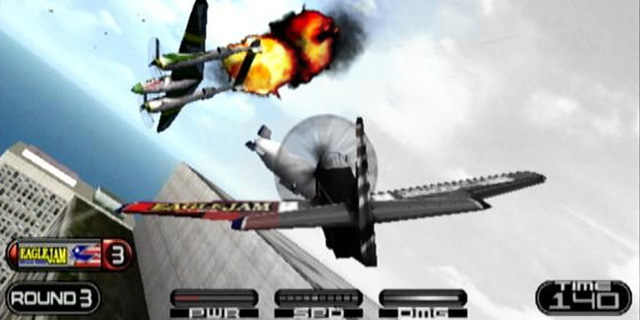
There are a lot of game projects that just didn’t happen for one reason or another, but to me, it’s most heartbreaking when a game’s completely finished and just doesn’t see the light of day. Propeller Arena, a first-party flight combat game for the Dreamcast, is one of those games. Why didn’t it release? Well, it was a late-2001 game about planes flying around tall buildings, so it suffered the fate that the original Advance Wars avoided by a day: a world that just wasn’t ready to have fun with that setting.
Propeller Arena
What It Was: A plane-combat party game for the aging Dreamcast
What Happened: September 11th attacks made a release inappropriate
Why We Wanted It: The Sega-made party-shooter was a perfect fit for the system
It’s unfortunate, because Propeller Arena would’ve been one of those late-life cult hits we’re always talking about. By that time, the Dreamcast was on its way out, and that’s precisely why we didn’t get it once the world had started to recover from tragedy. Developed by Sega AM2, the game featured rather slow-paced flying, making it more about combat than aerial maneuvers. It featured the arcade sensibility we’ve come to know and love from the company, and was a showcase for the system’s multiplayer focus, with both local 4-player and online play.
One level in particular seems to have been the game’s downfall: Tower City, an arena roughly modeled on New York City and featuring tall skyscrapers as the area’s main obstacles. The buildings don’t take damage or fall if you fly into them, and no other levels feature buildings of any kind, but Sega simply didn’t want to take the risk, or go through the effort to remove the one level and release the rest as it made the transition to a third-party role.
As with most games that are completely done but don’t release, Propeller Arena has surfaced online, giving us a good sense of just what we missed out on. The AM2 sensibilities are definitely there, from the obnoxious audio cues to the strange and silly characters. If it had been released, it would’ve followed in the footsteps of Alien Front Online, with voice chat and even broadband support. Mostly, though, it would’ve been in the same breath as Power Stone 2 as a Dreamcast game that makes the system worth playing with friends for years to come.



















